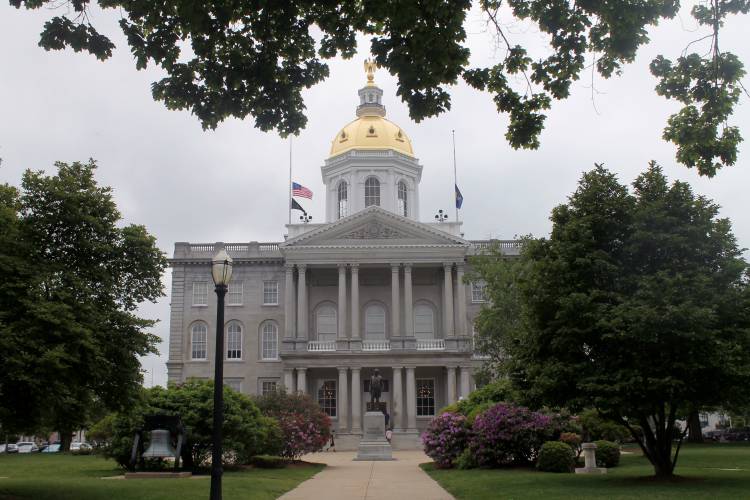House Republicans recommend eliminating most of anti-hunger bill

Holly Ramer/AP file photo
| Published: 05-01-2024 9:27 AM |
House Republican lawmakers are moving to strip out major portions of a bipartisan bill aimed at addressing child hunger, arguing they are costly and unnecessary, in a decision that drew sharp criticism from Democrats and advocates.
The House Finance Committee Division III voted Monday to recommend eliminating most of House Bill 499, an omnibus bill that would create a program to provide families meal assistance in the summer as well as new programs to encourage breakfast take-up in school.
Sponsored by Sens. Becky Whitley, a Hopkinton Democrat, and Denise Ricciardi, a Bedford Republican, the bill passed the Senate unanimously. But the proposed House amendment would eliminate most of those programs from the bill, including the summer meal program, which would allow the state to receive about $4.5 million per year in federal funding to distribute in the summer to families who qualify for free or reduced-price meals at school.
House Republicans have raised issues with required startup costs for the program: The state would need to provide $1.2 million in its first year for administrative expenses, and then about $259,000 every year after. That represents half the cost; the federal government would provide an equivalent in matched funds.
Some Republicans objected to spending federal money at all.
“The federal government is very broke right now,” said Rep. J.R. Hoell, a Dunbarton Republican. “So counting on somebody who’s very broke to continue to write checks is a fraught mission.”
Supporters of the bill have countered that those costs are relatively low compared to the benefits low-income families would receive from the EBT program.
“These are children that due to no fault of their own do not have healthy food in their kitchen cabinets and not enough of it,” said Rep. Laura Telerski, a Nashua Democrat. “And I think that for this division to throw out an opportunity for a relatively small investment from the state to enable this opportunity to bring that extra benefit to families who are struggling is really unfortunate.”
Article continues after...
Yesterday's Most Read Articles
 New Hampshire targets sexual exploitation and human trafficking inside massage parlors
New Hampshire targets sexual exploitation and human trafficking inside massage parlors
 New Hampshire legalizes public alcohol consumption in designated ‘social districts’
New Hampshire legalizes public alcohol consumption in designated ‘social districts’
 State rules Epsom must pay open-enrollment tuition to other school districts, despite its refraining from the program
State rules Epsom must pay open-enrollment tuition to other school districts, despite its refraining from the program
 ‘A little piece of everything I like’: New Pittsfield barbershop brings more than a haircut to downtown
‘A little piece of everything I like’: New Pittsfield barbershop brings more than a haircut to downtown
 Remembered: Friends recall stories about the lives of those who died without housing
Remembered: Friends recall stories about the lives of those who died without housing
 Town turmoil: Chichester town administrator resigns again
Town turmoil: Chichester town administrator resigns again
Monday’s recommendation is not final; Division III is a nine-member subcommittee of the full 25-member House Finance Committee, and the full committee will need to approve the measure in the coming weeks. But the amendment was supported by top Republicans on the Finance Committee, including Chairman Ken Weyler of Kingston.
And the recommendation comes as lawmakers have quarreled in recent years over whether and how to expand school meal assistance in New Hampshire. Earlier this month, House Republicans rejected a bill to raise the eligibility for free and reduced-price meals in school from 185 percent of the federal poverty level to 350 percent. Republicans have also voted down efforts to expand the number of participants in school meal programs by enrolling the state into Medicaid Direct Certification, which would allow schools to use Medicaid data to sign up families automatically.
A multi-pronged bill
HB 499 seeks to carry out a number of changes to boost meal services, both inside and outside schools.
The bill would require that school districts provide both breakfast and lunch during school hours; currently, they are obligated to provide only one meal. It would allow school districts to implement “breakfast after the bell,” in which students are allowed to eat breakfast after classes begin so they don’t need to arrive early, and receive reimbursement from the state for extra costs.
The bill would require that school districts offer online applications for families to sign up for the free and reduced-price meal program. It would provide an opportunity for school districts to receive additional federal reimbursement for free and reduced-price lunches and breakfasts if they also adopt a school wellness policy as defined in the federal Healthy, Hunger-Free Kids Act.
It would join New Hampshire to the federal summer EBT program, allowing families making up to 185 percent of the federal poverty level – $57,720 for a household of four – $40 per child per month to help with groceries. That federal money would be distributed in the form of pre-loaded cards and would work with the Supplemental Nutrition Assistance Program (SNAP) and the Special Supplemental Nutrition Program for Women, Infants, and Children (WIC).
The Department of Education has estimated that 37,000 children in the state would qualify for the program if approved.
And HB 499 would also direct the state to adopt the Elderly Simplified Application Project, a federal effort to improve access to food stamps for people 60 years and older by waiving certain application requirements and reducing the need to re-apply.
At its meeting Monday, the House Finance Division III passed an amendment to eliminate all provisions from the bill except the Elderly Simplified Application Project, in a 5-3 vote along party lines.
Laura Milliken, executive director of New Hampshire Hunger Solutions, an advocacy group that has championed the bill, said HB 499 was intended to bridge gaps that some low-income families face when school is not in session and children don’t have regular school meals.
While some school districts and private organizations provide food assistance in some areas of the state, Milliken said the summer EBT program would provide more steady support.
“Many times families can’t get their children to the place where the meals are being provided,” she said. “So it’s just a much more direct way of making sure that children are not hungry in the summer.”
Philosophical differences
To Milliken and other supporters of the bill, the federal money would provide a return on investment and help stimulate local economies by encouraging more food spending. If the bill doesn’t pass, the state Department of Education would not be able to participate in the program, Milliken said.
“The federal government has provided these funding streams and to my mind, it doesn’t make sense not to use them to feed hungry kids,” Milliken said Monday.
But House Finance Republicans raised concerns over cost and implementation.
Weyler argued that the summer EBT program duplicated aid already available to families through SNAP, often known as food stamps, and that it would make more sense to increase federal funding to those programs. He also said the “breakfast after the bell” model raised logistical questions.
“That whole arrangement of: what type of food, was it going to be in a refrigerator, were they going to pick it up going down the hall to the home room, or how was it going to work out? That wasn’t carefully thought out,” Weyler said. “… It just seemed to needlessly complicate everything without really spelling out how it would be done.”
And he said the bill’s supporters had not made the case that the bill is needed. “Do we really have that big a hunger problem in this state?” Weyler asked. “I don’t think they properly proved such a thing.”
Advocates for the bill say the “breakfast before the bell” model has been successfully tested and implemented in schools in other states. A 2015 survey by the Food Research and Action Center that polled 105 high school principals that implemented alternative breakfast approaches found that 82 percent reported increased school breakfast participation and 46 percent reported improved student attentiveness.
But Rep. Erica Layon, a Derry Republican who was filling in on the committee for Rep. Jess Edwards, questioned whether students should be given meals after school begins. “I have three young boys who cannot concentrate while they are eating,” she said. “I’m just worried about the consequences on the actual instructional time.”
Hoell had more fundamental objections. Support for food-insecure families should come from donations, organizations, and church groups, he argued.
“What we’re doing is requiring other taxpayers to foot the bill when we do this,” he said. “It is not about generosity at this point. Generosity starts when it comes out of your own piggy bank. We cannot compel someone else to fund this.”
As the debate unfolded, Democrats expressed alarm, accusing Republicans of gutting a broadly supported bill.
“I just think it’s inhumane,” said Rep. David Preece of Manchester. “And maybe it’s just my values, but I think it’s inhumane.”
Some raised issues with the process. The House Finance Committee has three subcommittees that are designed to work on distinct policy areas; Finance Committee III largely deals with health care spending, while Finance Committee II handles education spending. Democrats said Finance Committee III was recommending an amendment to eliminate provisions that should be examined by Finance Committee II.
“I think it’s shameful that we are throwing the whole thing away and we did not actually have proper process to even get to this point,” said Telerski.
The amendment will go to the House Finance Committee in the coming weeks; that committee has until May 16 to vote on whether to adopt the amendment and recommend the bill to the full House.







 New Hampshire school phone ban could be among strictest in the country
New Hampshire school phone ban could be among strictest in the country Concord became a Housing Champion. Now, state lawmakers could eliminate the funding.
Concord became a Housing Champion. Now, state lawmakers could eliminate the funding. ‘A wild accusation’: House votes to nix Child Advocate after Rep. suggests legislative interference
‘A wild accusation’: House votes to nix Child Advocate after Rep. suggests legislative interference  Sununu decides he won’t run for Senate despite praise from Trump
Sununu decides he won’t run for Senate despite praise from Trump
